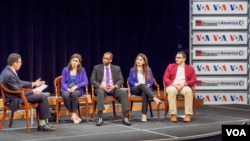Young Muslims in the United States are concerned about anti-Muslim feelings and calls to bar other Muslims from entering the country.
Several young Muslims spoke to a group of people during a recent visit to Washington D.C.
They said it is unfair to connect Muslims to terrorism.
Oya Rose Aktas is a student at Washington University in St. Louis, Missouri. She said that is putting “labels on people” and thinks “that is the driving force behind their actions.”
Aktas was a member of a VOA panel of four young Muslim Americans. They expressed their opinions about religion, anti-Muslim opinions and terrorism.
One of their concerns: the media’s repeated reporting of Islam as the religion of Omar Mateen. Florida police say Mateen killed 49 people last month at a gay nightclub in Orlando.
The panelists said most criminals are not identified by their religion.
One person who watched the discussion on Facebook said: “Muslims are not terrorists, (terrorists) are terrorists.”
Another panelist, Othman Altalib, was born in Iraq. He said U.S. Muslims are responsible for less crime than other groups. Those who become extremists, he said, spend most of their time alone looking at computers.
“So I definitely think the message for us should be, let’s get our youth now, bring them to the mosques, bring them to Muslim events and organizations and let them interact with other people.”
About 3.3 million Muslims live in the United States. That is about 1 percent of the total U.S. population. But the number is expected to double in the next 30 to 40 years.
The Young Muslims on the VOA panel said Muslims do not all think the same, or share the same beliefs.
Oya Rose Aktas had this to say.
“Oftentimes people try to split it (the Muslim community) into moderate Muslims and conservative Muslims, but there is a lot of diversity past that.”
Mohamed Hussein is a member of the Somali American Youth Foundation in Virginia. He says some young people have more than one identity that defines them.
“It definitely is a struggle, not only being a Muslim American, being Somali, being black, being young, there’s a lot of identities that you have to reconcile,” he said.
Hussein said he was lucky to be the son of immigrants to the United States. His parents, he said, had to “learn to change” from being part of a Muslim majority “to being a minority.”
The panelists also spoke about the call by Donald Trump to bar Muslims from entering the United States.
Trump is the likely presidential candidate of the Republican Party. He made the comment after a man and his wife shot and killed 14 people at a holiday party in San Bernardino, California. Federal investigators said the couple was under the influence of Islamic State militants.
Since then, Trump has amended his proposal. He now says the United States should ban people coming from countries with a terrorism problem.
Still, Altalib said: “It’s hard for me to believe that any sound-minded Muslim would vote for someone trying to put bans on them.”
But Hussein said voting should be a personal decision. “It is a disservice to Muslims to say vote one way or another way. Teach them to think for themselves,” he said.
I’m Dustin Reynolds.
Zlatica Hoke wrote this story for VOANews.com. Bruce Alpert adapted her report for Learning English. George Grow was the editor.
We want to hear from you. Write to us in the Comments Section and share your views on our Facebook Page.
___________________________________________________________
Words in This Story
panel – n. a group of people who take part in a discussion
label – n. a word or phrase that describes or identifies something or someone
gay nightclub -- n. a place that offers entertainment and drinks and serves lesbian, gay, bisexual, and transgender people
diversity – n. the quality or state of having many different forms, types, ideas
definitely – adv. without doubt
reconcile – v. to cause people or groups to become friendly again after an argument or disagreement
mosque – n. an Islamic religious center




